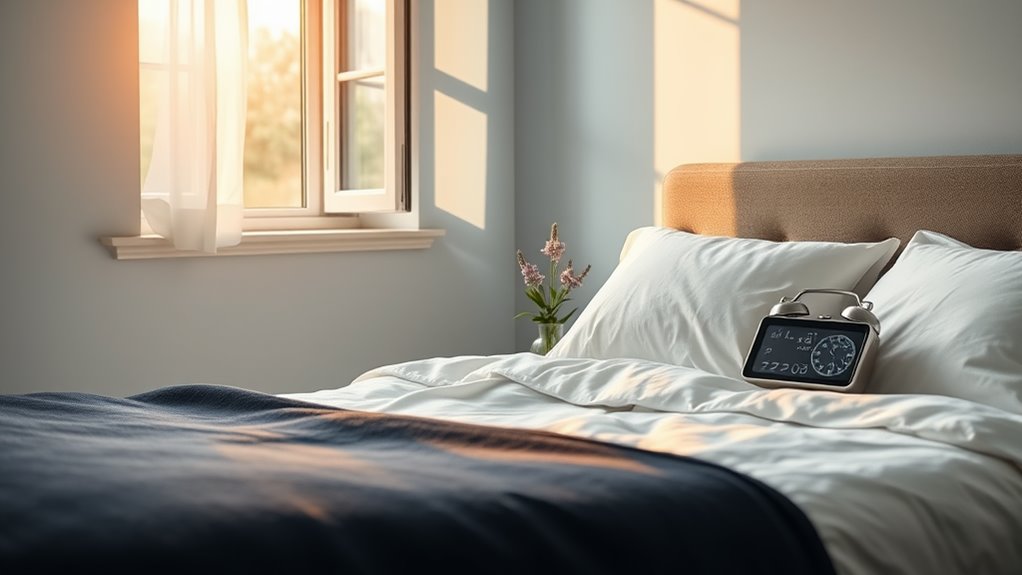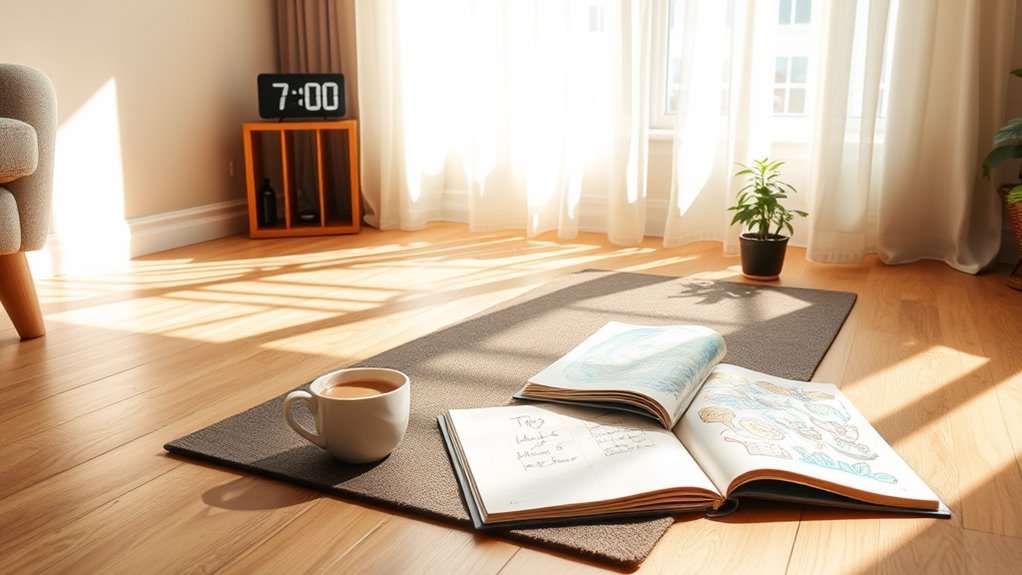How I Improved My Sleep by Making One Simple Change
Making one simple change to your bedtime routine, like establishing a consistent sleep schedule, can drastically improve your sleep quality. By going to bed and waking up at the same time each day, you help regulate your internal clock and promote better rest. Combining this with creating a relaxing environment and minimizing distractions can lead to more restful nights. Curious about other effective strategies? There’s so much more to explore for a better night’s sleep.
Key Takeaways
- I established a consistent sleep schedule by waking up at the same time daily, aligning my body’s internal clock.
- I created a relaxing sleep environment by investing in comfortable bedding and maintaining an ideal room temperature.
- I reduced screen time before bed, minimizing blue light exposure to enhance my sleep quality.
- I incorporated relaxation techniques, such as deep breathing and mindfulness meditation, to calm my mind before sleeping.
- I eliminated caffeine at least six hours before bedtime, preventing sleep disruptions caused by stimulants.
Identifying the Sleep Issue
How can you tell if you’re struggling with a sleep issue? Start by evaluating your sleep duration and quality. If you’re averaging less than seven hours and often feel fatigued, you might be one of the nearly 50 to 70 million Americans facing sleep disorders.
Pay attention to difficulties like trouble falling or staying asleep, which affect about 14.5% and 17.8% of adults, respectively. Additionally, consider factors like screen time before bed, which can exacerbate these issues.
If you notice patterns or persistent disturbances, it’s essential to acknowledge them as barriers to better sleep. Often, these issues go undiagnosed, so discussing your sleep quality with a healthcare provider can be an important step toward reclaiming restful nights. Prioritizing sleep is crucial for overall quality of life, as it significantly impacts both physical health and mental well-being.
The Power of Consistency
When you establish a consistent sleep schedule, you set the stage for numerous health benefits that can enhance both your physical and mental well-being. Regular sleep patterns not only promote longevity but also improve cardiovascular and metabolic health. You’ll find that consistency reduces impulsivity and enhances emotional regulation, especially in children, fostering better behavior and stress management. Additionally, maintaining a steady bedtime—even on weekends—keeps your body’s internal clock in sync, minimizing the risk of adverse health outcomes like obesity and anxiety. Research has shown that consistent bedtimes are more influential than sleep quality or duration in promoting emotional and behavioral regulation in children. Furthermore, transforming your sleep habits can lead to significant improvements in overall well-being and daily functioning.
Establishing a Sleep Schedule
Establishing a sleep schedule starts with setting consistent wake-up times, which helps regulate your body’s internal clock. If you’re struggling with your sleep, making gradual adjustments can lead to better rest without overwhelming your system. Embracing regularity not only enhances your sleep quality but also boosts your overall well-being. Research has shown that structured sleep can improve alignment between sleep onset and your circadian phase, further contributing to a more restful night. Incorporating simple nighttime rituals into your routine can also support the establishment of a healthy sleep schedule.
Consistent Wake-Up Times
While many factors influence your sleep quality, setting a consistent wake-up time is one of the most effective changes you can make. By aligning your wake-up time with your body’s natural circadian rhythm, you’ll enhance your overall sleep quality, reducing insomnia and sleep deprivation. This consistency anchors your daily routines and synchronizes hormone release, helping you feel alert in the morning and sleepy at night. Maintaining a regular schedule greatly boosts your morning alertness and minimizes sleep disruptions, promoting better sleep hygiene. Additionally, establishing a consistent wake-up time can lead to better overall health by regulating your body’s biological processes.
Plus, sticking to a set wake-up time connects to lower risks of chronic diseases, improved immune function, and enhanced mood. Ultimately, this simple adjustment can elevate your cognitive performance and help you achieve mastery in your daily pursuits.
Gradual Sleep Adjustments
After setting a consistent wake-up time, the next step is to focus on gradual sleep adjustments to create a stable sleep schedule.
Begin by planning your ideal bedtime and work backward, making incremental changes of about 15 minutes each day. This avoids shock to your system, allowing your circadian rhythm to adapt smoothly. Incorporate morning sunlight exposure to signal your brain that it’s time to be awake. Maintain a consistent bedtime routine that includes relaxation techniques, such as reading or meditation, to reinforce your new schedule. Additionally, establishing a regular sleep schedule can greatly improve sleep quality over time. Common sleep mistakes can often derail your progress, so be mindful of your environment; keep your bedroom cool and dark, and establish an electronic curfew to minimize distractions before sleep.
Monitor your progress and adjust as needed to promote lasting improvements.
Benefits of Regularity
When you commit to a consistent sleep schedule, you unfasten numerous benefits that positively impact both your physical and mental well-being.
Regular sleep strengthens your immune system, aids muscle recovery, and reduces risks of chronic diseases like diabetes and heart issues. You’ll also find it easier to maintain a healthy weight as your hunger hormones stabilize.
Mentally, a consistent schedule enhances mood regulation, diminishes anxiety, and boosts cognitive functions, allowing for sharper focus and better decision-making.
Creating a Relaxing Environment
Creating a relaxing environment is essential for improving your sleep quality, as it sets the stage for rest and rejuvenation. Focus on these key elements to enhance your sleep:
| Key Element | Importance |
|---|---|
| Comfortable Bedding | Right mattress and sheets promote comfort |
| Ideal Room Temperature | A cool room (60-67°F) aids natural cooling |
| Eliminating Distractions | Keep electronics out to reduce interruptions |
Invest in a suitable mattress and breathable sheets to guarantee comfort. Maintain a consistent room temperature for ideal sleep conditions, and eliminate distractions by keeping electronics away. These changes create a sanctuary conducive to relaxation, allowing you to achieve the restful sleep you desire.
Managing Light and Noise
How can managing light and noise transform your sleep experience? By creating an ideal sleep environment, you can greatly enhance your rest. Here are three strategies to take into account:
- Control Light Exposure: Reduce evening brightness and avoid screens to help align with your natural circadian rhythm.
Use light-blocking curtains to eliminate disruptive light during sleep.
- Implement White Noise: Utilize a white noise machine to mask external sounds that can disturb your slumber.
This simple addition can lead to deeper, more restorative sleep.
- Craft a Quiet Space: Invest in soundproofing materials to minimize noise intrusion.
A serene environment fosters improved sleep quality and duration, setting the stage for revitalized mornings.
Temperature Control for Comfort
To improve your sleep, pay attention to your room temperature and bedding materials.
Aim for a comfortable range between 65°F and 70°F, and choose breathable fabrics that help regulate your body heat.
Making these adjustments can greatly enhance your overall sleep quality.
Ideal Room Temperature
The ideal room temperature plays an essential role in achieving restful sleep, with many experts recommending a range between 60°F and 67°F (15.6°C to 19.4°C). Staying within this range supports your body’s natural temperature drop, important for deep sleep stages.
To master your sleep environment, consider these three tips:
- Adjust your thermostat before bedtime to hit that best range.
- Use fans or open windows for natural cooling, especially during warmer months.
- Experiment with seasonal settings to maintain consistent comfort throughout the year.
Finding your ideal temperature can drastically enhance your sleep quality, promoting restorative cycles and minimizing disruptions.
Don’t underestimate the power of a well-regulated bedroom environment!
Bedding Material Choices
Choosing the right bedding materials can greatly impact your sleep quality, especially when it comes to temperature control.
Opt for Tencel or bamboo sheets, known for their breathability and moisture-wicking properties, which help prevent night sweats. While cotton is a classic choice, it may not offer the same cooling benefits.
For duvets, consider wool for natural temperature regulation or silk for luxurious warmth without weight.
Prioritize materials that enhance breathability and moisture management, as they promote a comfortable sleep environment. Incorporating technology, like gel-infused memory foam or Outlast fabrics, can also elevate your comfort.
Avoiding Stimulants Before Bed
When you wind down for the night, avoiding stimulants can greatly improve your sleep quality. Stimulants like caffeine and nicotine may enhance alertness, but they disrupt your sleep cycle, leading to insomnia and fragmented rest.
To master your sleep hygiene, consider these three strategies:
-
Cut Off Caffeine: Stop consuming caffeine at least six hours before bedtime to reduce its disruptive effects.
-
Mind Your Medications: Check if any OTC or prescription medications contain stimulants; adjust their timing to minimize interference with sleep.
-
Limit Sugar Intake: Avoid high-sugar snacks and drinks in the evening, as they can spike energy levels and disturb your nighttime routine.
The Role of Physical Activity
Incorporating regular physical activity into your routine can markedly enhance your sleep quality. Engaging in moderate-intensity exercise not only reduces the time it takes to fall asleep but also increases total sleep time.
You’ll find that adults who exercise regularly experience longer, more restorative sleep compared to inactive individuals. Exercise helps regulate your circadian rhythms and release endorphins, effectively reducing stress and anxiety—common barriers to restful sleep.
Remember, timing matters; avoid high-intensity workouts close to bedtime to prevent disrupting your sleep cycle. By tailoring your physical activity to fit your lifestyle and ensuring consistency, you can optimize these benefits and improve your overall sleep experience.
Embrace this simple change, and watch your sleep transform.
Incorporating Relaxation Techniques
You can greatly enhance your sleep quality by integrating relaxation techniques into your nightly routine.
These methods activate your body’s natural relaxation response, reducing stress and anxiety that disrupt sleep.
Here are three effective techniques to contemplate:
-
Mindfulness Meditation: Practice focusing on your breath or a calming phrase to quiet your mind and reduce insomnia.
-
Deep Breathing Exercises: Engage in deep, slow breaths to lower your heart rate and promote a sense of calm.
-
Progressive Muscle Relaxation: Tense and then relax each muscle group, helping to release physical tension accumulated throughout the day.
Incorporating these practices consistently can lead to long-term benefits, enhancing your sleep quality and overall well-being.
The Impact of Naps on Sleep
How can napping transform your sleep experience? Incorporating short naps into your day can notably enhance your mood, cognitive function, and overall well-being.
A quick nap of just 10 to 60 minutes can reduce sleepiness and improve alertness, especially during that natural dip in your circadian rhythm between 1 and 4 p.m. Napping also aids in memory consolidation, making it easier to recall information later.
Aim for naps earlier in the day to avoid disrupting your nighttime sleep quality. While longer naps can be beneficial, keep them under 90 minutes to prevent sleep inertia.
Building a Pre-Sleep Routine
Establishing a pre-sleep routine can greatly improve your sleep quality and overall well-being.
By signaling to your brain that it’s time to wind down, you reduce sleep latency and enhance relaxation.
Here are three key components to include in your routine:
-
Turn Off Screens: Minimize blue light exposure to help your body prepare for sleep.
-
Engage in Calming Activities****: Try reading, listening to soothing music, or practicing meditation to promote relaxation.
-
Maintain a Consistent Environment****: Create a dark, quiet, and cool sleeping space to optimize sleep hygiene.
Implementing these practices can lead to fewer nighttime disruptions, improved mood, and a more restorative sleep experience.
Embrace this routine for mastery over your sleep quality.
Celebrating the Change and Its Benefits
Celebrating the positive changes in your sleep habits can lead to a remarkable transformation in your overall well-being. By embracing improved sleep quality, you’re not just enhancing your nights; you’re boosting your mental health, reducing anxiety and depression, and paving the way for longevity.
Incorporating moderate-intensity exercise into your routine further elevates your sleep outcomes, making you more resilient against stress. As you commit to consistency, you’ll notice better emotional regulation and improved cognitive function, resulting in heightened productivity.
Recognizing these benefits reinforces your commitment, ensuring that your new sleep habits become a cornerstone of your sustainable lifestyle. Ultimately, these changes contribute to a healthier heart and a longer life, empowering you to live with energy and purpose.
Frequently Asked Questions
How Long Does It Take to See Sleep Improvement?
You can start noticing improvements in your sleep within a few days to weeks. Consistency in your sleep patterns and environment plays a key role in how quickly you experience these benefits.
Can I Sleep in on Weekends?
Sleeping in on weekends might feel like hitting the snooze button on life, but it can disrupt your circadian rhythm. Instead, aim for a consistent sleep schedule to enhance alertness and overall well-being.
What if I Have a Busy Schedule?
If you have a busy schedule, prioritize sleep by scheduling it like any task. Set boundaries, create a calming environment, and maintain a consistent routine to guarantee you get the rest you need for peak performance.
Are Sleep Supplements Effective for Improving Sleep?
Sleep supplements can be effective for improving sleep, but results vary. Melatonin, amino acids, and certain herbs show promise. Always consult a healthcare provider to tailor choices to your individual needs and guarantee safety.
How Do I Know if I’m Getting Enough Sleep?
To know if you’re getting enough sleep, assess your daytime alertness, mood, and mental clarity. If you feel rested, focused, and energetic, you’re likely meeting your sleep needs. Prioritize quality and duration for ideal health.
References
- https://health.ucdavis.edu/news/headlines/try-these-13-tips-to-help-you-sleep-better/2023/07
- https://www.cag.edu.tr/uploads/site/lecturer-files/387-2-english-vocabulary-in-use-pre-intermediate-and-intermediate-redman-2017-4th-264p-sayfalar-silindi-3br9.pdf
- https://www.sleepfoundation.org/sleep-hygiene
- https://pmc.ncbi.nlm.nih.gov/articles/PMC8933808/
- https://www.nhs.uk/every-mind-matters/mental-wellbeing-tips/how-to-fall-asleep-faster-and-sleep-better/
- https://www.sleephealth.org/sleep-health/the-state-of-sleephealth-in-america/
- [https://pce-fet.com/common/library/books/51/2590_Paul_D._Leedy
- https://www.singlecare.com/blog/news/sleep-statistics/
- https://www.178wing.ang.af.mil/Portals/69/documents/afh33-337.pdf?ver=2016-12-15-101008-313
- https://www.cdc.gov/nchs/products/databriefs/db436.htm





